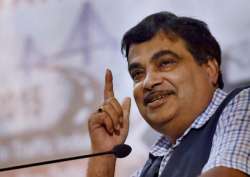Nitin Gadkari kicks off 'new age in transport sector'
"This is a start of a new age in transport sector," said Gadkari after inaugurating three electric vehicle charging stations at Niti Aayog.

Union Transport and Shipping Minister Nitin Gadkari on Thursday said the steps taken towards electric mobility in the country marks a new age in the transport sector and a big boost to the agrarian economy.
"This is a start of a new age in transport sector," said Gadkari after inaugurating three electric vehicle charging stations at Niti Aayog, the think-tank of Indian government.
Noting the country spends Rs 7 lakh crore in importing crude oil each year and it is a big problem for the local economy, apart from contributing to high pollution, he advocated bio and electric fuel, for which commercially viable technology is available, as it will bring revolutionary change both in transport and rural economy.
"Uttar Pradesh is the most abundant state in ethanol and its entire transport can run on it. It will create tremendous job opportunities in the farm sector," he said.
Each year, Uttar Pradesh, Haryana and Punjab burn paddy straw aggravating pollution over north India including Delhi and this problem can be solved if the vehicles take to bio-fuel, he said.
"Diversification of agriculture to fuel, power and alternative petroleum products has to happen. Water bottles made from farm products are bio-degradable in three days," he said.
Bio-fuels like ethanol can also solve the problems of unemployment among the youths in Northeast, which produces large amount of bamboos, he said.
As for electric vehicles, Gadkari said the average per kilometre cost for a diesel bus in Mumbai is Rs 110, whereas it is merely Rs 50 for electric buses. Secondly, the GST on petrol and diesel vehicles is 48 per cent, while it is 12 per cent for electric vehicles.
"If professionally managed, the commuting cost for passengers can be halved, pollution can be significantly slashed, import cost can be cut and jobs can be generated," he said.
Citing the example of price of solar power that came down from Rs 16.50 per unit to Rs 2.44 per unit, Gadkari said, "I am sure a time will come when electric car would be cheaper than a petrol car."
He said the first movers in the sector, whether the electric vehicle manufacturers or the charging station industry, would be major gainers.
On being asked about the delay in coming out with a policy for electric mobility in the country, Gadkari said there was no need for one as all departments concerned were taking actions as per the requirement.
Niti Aayog has now taken a decision to have the same charging plug for all electric vehicles from different auto manufacturing companies.
Though Niti Aayog Chairman Amitabh Kant said that it was for the government to take a final call on whether an Electric Vehicle policy would be issued, the minister said, "Technology is always ahead of rules and regulations. There are so many technological innovations happening on a daily basis that it would be a problem to freeze them in a policy."
Kant said the Niti Aayog has planned to replace all its vehicles with electric vehicles within the next four months.
Gadkari also announced that the government has come out with a tender to connect Dhaula Kuan and Manesar in National Capital Region (NCR), a distance of 70 km, with a cable car, and work would commence on it within three months.
"The capital cost for setting up one kilometre of metro is Rs 350 crore. With this it can be done at Rs 50 crore to carry the same number of passengers and if it is Made in India, it can be done in Rs 35 crore," he said.
The electric mobility movement will also give a strong boost to Make in India campaign, he added.